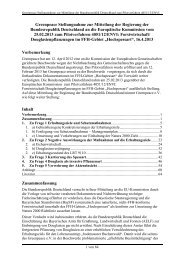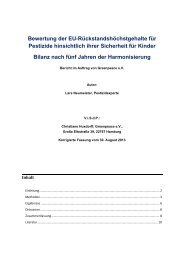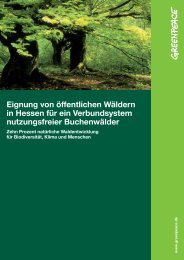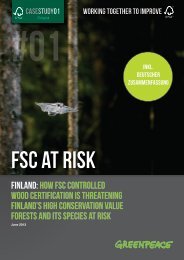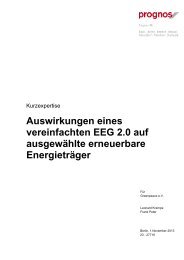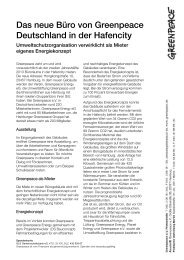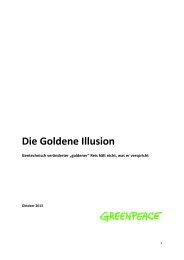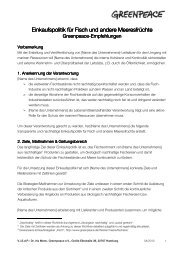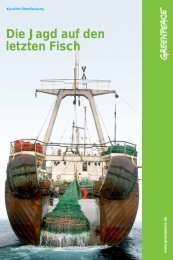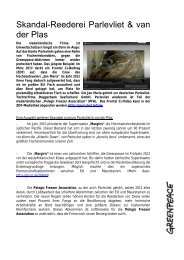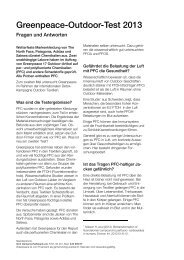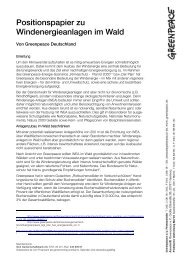Untitled - Greenpeace
Untitled - Greenpeace
Untitled - Greenpeace
Create successful ePaper yourself
Turn your PDF publications into a flip-book with our unique Google optimized e-Paper software.
24<br />
CARVING UP THE CONGO<br />
NORD-SUD TIMBER CASHES IN<br />
ON 3 MILLION HECTARES OF<br />
RAINFOREST IN BREACH OF<br />
THE MORATORIUM<br />
During 2002–03 the companies of the<br />
Liechtenstein-based, Portuguese-owned and<br />
managed Nordsudtimber (NST) group, in<br />
collaboration with officials in the DRC’s Ministry<br />
of Environment organised a major restructuring<br />
of the group’s forest titles. 113 The DRC State<br />
has been a shareholder in at least one of the<br />
NST group of companies, and the present level<br />
of state participation or political shareholders<br />
NST or its subsidiaries (Sodefor, Soforma,<br />
Forabola, CFT) is unclear. 114<br />
Perhaps motivated by the increase in the forest<br />
area tax from $0.062/ha in 2003 to $0.50/ha<br />
in 2007, 115 NST abandoned large areas of<br />
unproductive forest (logged-out forests and<br />
areas unsuitable for logging such as savannah<br />
or swamp). Certain NST logging titles were<br />
completely abandoned, and others only<br />
partially, with boundaries being modified to<br />
exclude the non-productive forest. 116 At the<br />
same time, however, the group obtained a<br />
number of new logging titles after the<br />
moratorium was signed. 117<br />
Figures on how much new forest NST obtained<br />
vary, but conservative estimates indicate that<br />
the vast majority of NST’s forest holdings (over<br />
65%, covering more than 3 million hectares)<br />
are new forest areas which it did not control<br />
prior to the moratorium. 118<br />
In 2004 and 2005, the then Vice President<br />
Abdoulaye Yérodia and then Minister of<br />
Forestry Anselme Enerunga confirmed the<br />
‘legality’ of these titles, 119 notwithstanding<br />
their post-moratorium allocation.<br />
NST argues that all these new titles are<br />
legitimate: it claims not to have been aware of<br />
the existence of the moratorium, and<br />
everything was arranged with the Ministry of<br />
Environment. 120<br />
NST does not dispute that it is logging in areas<br />
it did not control at the time of the moratorium<br />
– only it prefers not to call the titles in question<br />
‘new awards’. In a 2004 response to<br />
<strong>Greenpeace</strong>’s request for information, Sodefor<br />
(an NST company) manager José Albano Maia<br />
Trindade explained:<br />
‘Recently, a redefinition of part of Sodefor’s<br />
concessions was carried out with the objective<br />
of effectively allocating useful logging areas, in<br />
conformity with the permits we controlled, and<br />
which would give us the means to restart our<br />
activities at the end of the war years. It’s thus<br />
not a question of the award of new<br />
concessions.’ 121 [<strong>Greenpeace</strong> emphasis]<br />
Clearly numerous new titles have been<br />
allocated under the guise of a ‘redefinition’ or<br />
‘exchange’ of old titles. These awards<br />
nevertheless constitute new acquisitions, and<br />
thus violate the moratorium.<br />
In addition, these new NST titles seem to<br />
violate the new DRC Forestry Code: 122<br />
s Method of allocation: NST post-moratorium<br />
titles were all arranged via discretionary<br />
procedures rather than via a public auction<br />
procedure. It is difficult to argue that the<br />
allocations of several dozen titles covering<br />
three million hectares can all be presented as<br />
‘exceptional cases’, as required by Article 83<br />
of the Code.<br />
s Sale price for allocation: Since no floor price<br />
for auctioning concessions had been set at<br />
the time the new titles were allocated, it was<br />
impossible to fix a price for discretionary<br />
allocations as required by Article 86.<br />
s Area of allocation: The area obtained has<br />
been largely in excess of 500,000 hectares,<br />
in contravention of Article 92 which limits<br />
the area of new titles that any one company<br />
can obtain.<br />
s Consultation with local communities: There<br />
was no public consultation on the new<br />
allocations, in contravention of Article 84<br />
(indeed, the rules for public consultation<br />
were yet to be defined by ministerial decree<br />
at the time NST’s new titles were arranged)<br />
s Redundant framework: Finally, the new titles<br />
are referred to as ‘letter of intent’ and ‘wood<br />
product supply guarantee’. Neither of these<br />
types of permit are recognised in the new<br />
Forestry Code and they can no longer legally<br />
be allocated.<br />
©<strong>Greenpeace</strong>/Daniels



